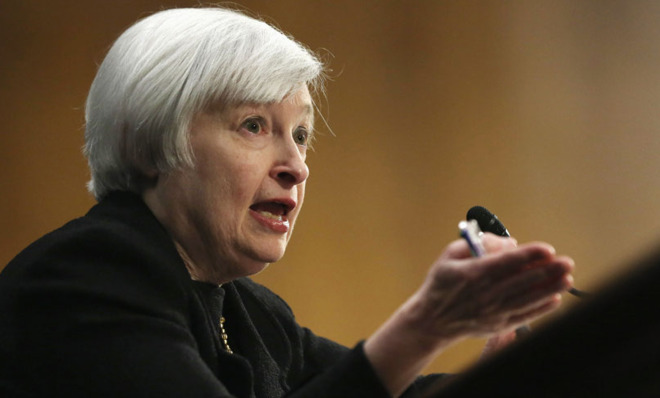Did the Fed's bond buying work?
Everything you need to know, in three paragraphs

A free daily email with the biggest news stories of the day – and the best features from TheWeek.com
You are now subscribed
Your newsletter sign-up was successful
"Future historians will wince when they examine" the grand economic experiment that recently ended, said Liam Halligan at The Daily Telegraph (U.K.). The Federal Reserve has finally called time on its immense bond-buying program, better known as quantitative easing, or QE. Originally billed as a $600 billion emergency measure to prop up the failing housing market in the darkest days of 2008, QE ballooned into a six-year, $4 trillion spending spree on U.S. Treasuries and mortgage-backed securities, aimed at invigorating a weak economic recovery by pumping ever more money into the financial system. In the end, the winners were Wall Street banks, which were able to mask "the true state of their rancid balance sheets" as they were repeatedly "hosed down" with trillions of dollars created out of thin air. Even as Wall Street raked it in, 99.5 percent of us "got nothing," said Jonathon Trugman at the New York Post. The Fed hoped that historically low interest rates would spur consumers and businesses to borrow and spend more. But banks refused to lend and instead accumulated vast reserves and posted handsome profits, all with the aid of the Fed's unprecedented money machine.
"QE may not have been the perfect policy solution," said Jill Schlesinger at the Chicago Tribune, but "doing nothing would have been far worse." The first two rounds of QE in 2008 and 2010 probably increased economic output almost 3 percent and helped add more than 2 million jobs, in part by boosting confidence in banks and in the economy. After the third round was launched in 2012, we avoided a potential recession in 2013 and watched as unemployment recently fell to 5.9 percent, all while the stock market soared and inflation remained tame. Sure, "savers have taken it on the chin" in the face of zero-percent interest rates, but they are still better off than they would have been "if the economy were stuck in an even lower gear." The Fed "did the right thing" given the extraordinary circumstances, said BloombergView in an editorial. Faced with the threat of "great and lasting economic damage," the central bank accurately gauged that "the risks of QE were small in relation to the possible gains." And perhaps just as important is that we now know the Fed is "willing to do everything in its power to revive the economy."
The Fed's work isn't over, said Chris Matthews at Fortune. The central bank now needs to get rid of the trillions of dollars' worth of bonds it has accumulated, and that process will have dramatic effects on the financial system that are difficult to predict. What's more, the Fed "has been consistently overoptimistic" about the health of the economy, most recently when it insisted it was done with QE after the first two rounds. If the economy begins to weaken again, "the chances that the Fed will rev up its bond-buying machine in the near future are significant." So if you want to believe that QE ended definitively last week, "you'd have to believe that we are in the beginning stages of a legitimately robust recovery." And on that question, the jury is still out.
The Week
Escape your echo chamber. Get the facts behind the news, plus analysis from multiple perspectives.

Sign up for The Week's Free Newsletters
From our morning news briefing to a weekly Good News Newsletter, get the best of The Week delivered directly to your inbox.
From our morning news briefing to a weekly Good News Newsletter, get the best of The Week delivered directly to your inbox.
A free daily email with the biggest news stories of the day – and the best features from TheWeek.com
Sergio Hernandez is business editor of The Week's print edition. He has previously worked for The Daily, ProPublica, the Village Voice, and Gawker.
-
 What to know before filing your own taxes for the first time
What to know before filing your own taxes for the first timethe explainer Tackle this financial milestone with confidence
-
 The biggest box office flops of the 21st century
The biggest box office flops of the 21st centuryin depth Unnecessary remakes and turgid, expensive CGI-fests highlight this list of these most notorious box-office losers
-
 The 10 most infamous abductions in modern history
The 10 most infamous abductions in modern historyin depth The taking of Savannah Guthrie’s mother, Nancy, is the latest in a long string of high-profile kidnappings